Thursday Feb 19, 2026
Thursday Feb 19, 2026
Wednesday, 13 July 2016 00:00 - - {{hitsCtrl.values.hits}}
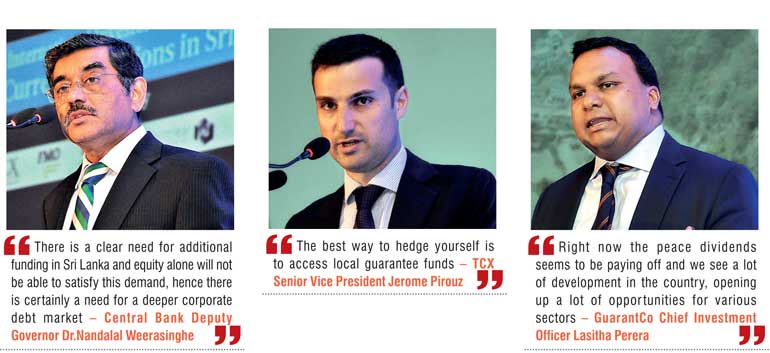

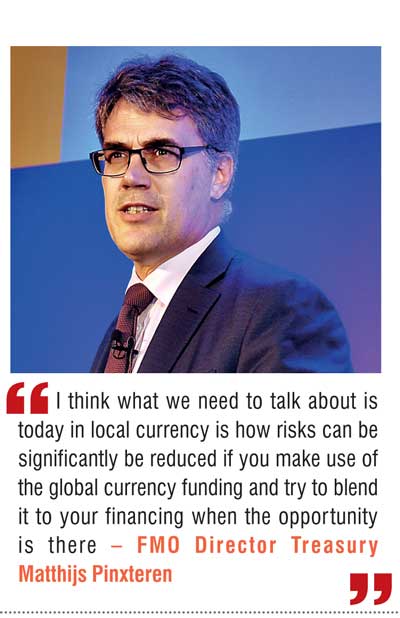
By Charumini de Silva
In an effort to expand the horizon of local banks, Non-Bank Financial Institutions (NBFIs) and micro finance institutions, a specialised forum titled ‘International Investor Perspective on Local Currency Solutions’ was held recently in Colombo.
The forum was and ideal opportunity to exchange experiences and raise awareness about local currency funding options from Development Financial Institutes (DFIs) and foreign investors.
The forum was jointly organised by Netherlands based The Currency Exchange Fund (TCX), FMO – Entrepreneurial Development Bank, Frontclear and UK-based GuarantCo, together with local investment bank First Capital Holdings PLC.
Delivering opening remarks First Capital Holdings PLC Group CEO Dilshan Wirasekara said considering where Sri Lanka is currently placed it was opportune to explore investment opportunities in financial services.
“Today, if you look from a global perspective, there is quite a bit of turmoil both in financial terms as well as due to terrorism. However, looking at Sri Lanka’s socio-economic position, I think we could sustain in the medium to long-term,” he stressed.
 Although there are mixed feelings when it comes to foreign borrowings and certain constrains which comes along with it, he said having been engaged with these DFIs he assured that it was very rewarding as it brings in a lot of controls, good governance, best practices that will be introduced to Sri Lanka’s financial sector from these DFIs operating in developed markets.
Although there are mixed feelings when it comes to foreign borrowings and certain constrains which comes along with it, he said having been engaged with these DFIs he assured that it was very rewarding as it brings in a lot of controls, good governance, best practices that will be introduced to Sri Lanka’s financial sector from these DFIs operating in developed markets.
Current position of financial markets in SL
Central Bank Deputy Governor Dr. Nandalal Weerasinghe delivering the keynote address highlighted the importance of financial markets as a key segment of the overall financial system and added that the Government has given high priority to develop financial markets that help lower the cost of capital.
Noting that Sri Lanka has a fairly strong, transparent and liquid government debt market he said bonds issued in the domestic market is broadly divided into three types in terms of the issuers’ ownership; Government bonds, debentures issued by public enterprises and debentures issued by the corporate sector.
According to him the Rupee denominated Government bond market is represented by Treasury bonds, which accounts for over 66% amounting to Rs. 3,305 billion or $22.8 billion of Government domestic debt stock at end 2015.
He said the opening of the Government Treasury bond market for foreign investors in 2006 could be considered as a major milestone to improve the competitiveness and expand the investor-base in the bond market. But noted the private debt market in Sri Lanka is at a primary level with majority of issuance of only debentures.
“However, domestic market is yet to experience the benefit of derivative instruments, other than the foreign exchange forwards and swaps, including the basic ones such as interest rate swaps. This is an area that banks and markets could develop themselves to introduce products, where both financial institutions and customers could benefit,” he noted.
Pointing out that raising funds for expansion in economic activity through capital markets is limited only to large corporates, thereby leaving the domestic banking sector as the major source of financing for the corporate sector as well as for the SME sector, the Deputy Governor urged that measures such as stock market capitalisation and corporate debt securities as a percentage of GDP needs further development in the capital market.
Challenges and issues
He said although a more active market exists for Government bonds, the corporate debt market is still in its infancy with only a few institutions dealing with secondary market debt, while the equity market has been given a plethora of incentives over the years.
Noting that lack of liquidity, limited number of large corporate players, and limited number of bond issues by credit-worthy corporate entities has caused constrained development of the corporate debt market, he added inadequate developments in the private sector are mainly due to low liquidity and unavailability of proper risk mitigation financial instruments in the country.
Outlining the importance of local currency, Dr. Weerasinghe said it will facilitate new foreign and domestic investments, which would eventually contribute towards economic growth of the country.
He said risk mitigation innovative products will encourage private sector to enter into productive ventures. In addition, capacity building and enhancing the knowledge on derivatives, securitisation amongst financial institution, consumers and regulatory bodies are vital in successful popularisation of debt and derivatives market.
While admitting that domestic capital market has great potential, Dr. Weerasinghe noted that it is an area the country had been lagging behind, especially in the corporate bond market.
He said there is a high demand for funding within the corporate sector, given the number of investment plans that had been given the green light since the end of the civil war.
“There is a clear need for additional funding in Sri Lanka and equity alone will not be able to satisfy this demand, hence there is certainly a need for a deeper corporate debt market. There is likely to be plenty of demand among insurance companies, provident funds and other institutional investors for higher yielding new financial instruments,” he stressed.
According to the Economic Policy Statement of the Government it lays out plans to establish an International Financial Centre (IFC) in Colombo along the lines of the Dubai IFC and other offshore centres in the region. He acknowledged that policy initiatives have already been taken to establish the Colombo IFC (CIFC) connecting with the world’s financial markets through international financial services.
Promoting local currency solutions in SL
Noting that over 40% of Sri Lanka’s Government debt is denominated in foreign currency, he stated the private sector is reluctant to borrow from abroad as they cannot hedge the risk in the event of depreciation in the local currency.
He said local currency solutions would mitigate the risk and generate cheaper funding with a minimum currency risk, while providing guidance on funding. Therefore instruments such as, hedging, credit guarantees, local currency bonds issued in the international market would help investors to find new methods and ways to finance their funding needs, he added.
Dr. Weerasinghe insisted that developing a strong local currency debt instruments would result in wider access to credit and is a stable source of long term funding for the corporate sector, allowing corporations to have wider access to credit to finance viable projects. One of the biggest benefits is that it reduces over-dependence on the banking sector for corporate debt financing and promotes long-term funds.
Way forward
“We have already seen growing confidence in the currency among some large international investors, which means that in the near future we may be able to issue international bonds in Rupees, which would minimise our exposure to exchange rate movements. I hope that this forum will set the stage for such achievement,” he pointed out.
He assured that a number of policy measures have been already implemented with a view of developing the corporate bond market. However, urged that development process of the cooperate bond market has to be continued with a well-designed awareness program to educate both corporate players and investors about the important role that could be played by the bond market providing alternative options for investors to invest their savings and for corporate players to reduce the vulnerability to the system risks by diversifying their alternative funding sources.
As the country aspires to emerge as a regional financial centre, he asserted that gradual development of proficient and liquid currency, derivatives and commodities markets to accommodate complex financial instruments, and the development of a dynamic and globalised regulatory regime was important.
The Deputy Governor pointed out that more focus should be placed on the development of deep and liquid corporate debt markets over the medium term, while undertaking initiatives to improve the depth of the equity markets through increased market participation of both local and foreign investors.
“The lack of a well-developed private equity and venture capital industry continues to remain a concern, as the presence of such industries could help catalyse the economy’s attempts to transition into a knowledge driven one,” he stated.
In addition Dr. Weerasinghe stressed developing the venture capital market would also be advantageous in attracting substantial foreign direct investments (FDIs) over the medium term, which would bring about innovation and improved management systems.
TCX perspective
Outlining the concept of TCX, the company’s Senior Vice President Jerome Pirouz explained that the firm hedges the currency and interest rate mismatch which is created in cross-border investments between international investors and local market participants in frontier and less liquid emerging markets.
In Sri Lanka, TCX had been supporting local currency inflows mostly from offshore investors.
“We have hedged $66 million in local currencies in 16 different transactions. Two and a half years ago we even went a little deeper to hedge Softlogic Finance PLC. Softlogic raised dollar funding to match assets and liabilities. The company needed to hedge its foreign investment exposure,” he added.
He said the hedge helped Softlogic to match rupee assets which came from leasing and hire purchase contract with a dollar credit line.
Noting currencies are volatile and have deep potential to depreciate he said 2015 was a tough year with emerging currencies depreciating twice during last year. However he noted that South East Asia was relatively immune to other regions.
He pointed out that Sri Lanka was not the only country to seek out IMF support as it had been a busy player supporting many economies over the last few years.
Pointing out hedging strategy helps investor to have less volatile revenue base and a more resilient balance sheet he said: A hedging partner like TCX is helping investors to avoid debt servicing in US dollar to increase unexpectedly and focus on a healthy growth strategy.”
Recommending keynote speaker’s insights Pirouz stated: “As the Deputy Governor said, the best way to hedge yourself is to access local guarantee funds.”
Ambitious GuarantCo
GuarantCo Chief Investment Officer Lasitha Perera said Sri Lanka is a very important market for them as they have ambitious plans here to complete its first Rupee denominated project financing, to help extend the average tenor of corporate bonds from five to 10 years and also to have a Sri Lankan GuarantCo.
“Our first transaction in Sri Lanka was with Softlogic Financing to support Rs. 1.4 billion fund raising for vehicle leasing business. It was the first AAA rated corporate debenture in Sri Lanka,” he recalled.
Noting they are open for business in Sri Lanka he highlighted some of the projects they have in the pipeline which includes; in 25MW waste-to-energy project, greenfield cement manufacturing project, rehabilitation of water and sewage network for local municipality.
“We haven’t done much yet, but we have the capacity to go from $10 million up to $150 million exposure in Sri Lanka,” Perera noted.
He said GuarantCo guarantees local currency and bonds to finance infrastructure in lower income countries, while aims at building sustainable financing capacity in domestic capital markets through partnering with local institutions and introducing new approaches to project risk evaluation and financing.
FMO keen on expanding footprint in SL
Being actively involved in Sri Lanka’s financial sector for over three decades FMO Director Treasury Matthijs Pinxteren said that they were keen on expanding their footprint in the years to come with the economic progression of the country.
FMO provides its services mainly to banks as well as non-bank financial institution (NBFIs) and has a portfolio of over $170 million in Sri Lanka already.
“We offer clients financing and services from loans and credit to mixed packages also in local currencies. We specialise in sectors such as energy, financial institutions, agribusiness and infrastructure, manufacturing and services which we believe have the highest long-term development impacts on,” he said.
FMO is the Dutch Development Bank promoting private sector growth in more than 85 developing countries and emerging markets offering capital knowledge and networks. It has a strong track record proves it is possible to invest successfully in challenging environments, creating a positive and an attractive return.
Frontclear calls for development of finance
Frontclear Senior Vice President Andrei Shinkevich said due to counterparty credit risk, local financial institutions are excluded from participating in global interbank markets.
Hence, he pointed out that development of finance has become a priority.
Further he noted that lack of access to interbank markets hinder local financial institutions capacity to gain the capital needed and at advantageous terms, to enable growth and expanded lending to SMEs and others.
Citing a recent deal of Frontclear he said the firm guaranteed a $25 million cross-currency repo transaction between Commercial Bank of Africa (CBA) and Standard Bank of Southern Africa (SBSA), a first of its kind transaction which provides for the cross border transfer of legal ownership of the local collateral instruments. Thereby, he suggested that Sri Lanka could alsopave way to a more robust, stable and inclusive interbank market in the near future.
“Frontclear is a financial markets development company focused on catalysing stable and inclusive interbank markets in emerging and frontier markets. Frontclear facilitates access to financial markets for local institutions to local and global markets through the provision of credit guarantees to cover their counterparty credit risk,” he explained about the company.
In addition the he said firm provides technical assistance to help with product implementation and systemic constraints which are beneficial for emerging markets. Frontclear’s Basel III compliant guarantees and are in turn counter-guaranteed by KfW, an AAA-development financial institution.
SL requires a local currency solution
SBI Ven Capital Executive Vice President Arno De Vette said as timing of exit period and exit amount are difficult, plus local regulation in Sri Lanka requires a local currency solution via a securities investment account, it is difficult to hedge currency risk with equity investments.
He pointed out theta macroeconomic study on foreign exchange reserves, current account developments, political and monetary stability and other factors are key elements to determine whether an equity investment in Sri Lanka makes financially sense.
“If such a local currency solution to mitigate this currency risk exists, we would love to know and explore usage. But also without this local currency solution we are eager to invest in your beautiful country,” he stressed.
SBI Ven Capital is a leading private equity firm that invests in financial services and technology sectors. The firm has a proven track record of partnering with companies and assembling critical resources needed to grow businesses in the South and Southeast Asia region.
Pix by Lasantha Kumara
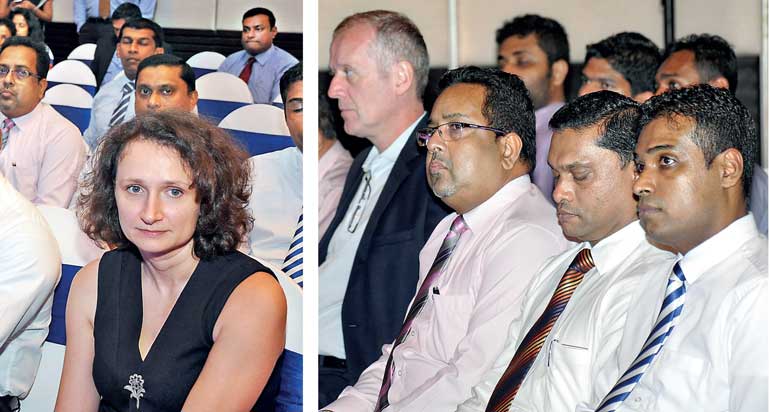
Q: What opportunities do you see in Sri Lanka right now?
Jerome: In the long term, TCX can add a lot of value in my opinion, but that will trigger more energy and infrastructure space. For fund transactions I would say is the floating rate of funding. Something I didn’t explain is you can secure funding on a fixed rate basis or floating. For floating we offer funding against the six months T-bills. However, if the financial institutions are willing to lend to their clients against that six months T-bills, I think it is an effective way to secure local currency financing.
Lasitha: Right now the peace dividends seems to be paying off and we see a lot of development in the country, opening up a lot of opportunities for various sectors. Every time that I come to Colombo it amazes me how new buildings have been constructed, talking to the financial institutions how it had evolved, and underneath all that is driven by the SME markets. There are many entrepreneurs in Sri Lanka, we want to help them and be part of their story by helping you by raising the capital you need to support them and help them grow. Softlogic for us was a big step, in terms of fulfilling that ambition. But we also see the opportunity for local capital market. The Deputy Governor was speaking about the aspiration for Sri Lanka to become an IFC for the region, but I think that will really happen if it has its own strong local capital market in the best place and we want to help that happen. That’s where we see the massive opportunity here in Sri Lanka. I think any capital market to be a regional power, apart from having a strong regime you need to have abundance human capital and I think that also exist for Sri Lanka. We see a lot of potential in the people here.
Matthijs: We are here long term. The term that we need to take into account is that there can be vulnerabilities and there are challenges. I think what we need to talk about is today in local currency how risks can be significantly be reduced if you make use of the global currency funding and try to blend it to your financing when the opportunity is there. I am here for the first time in your country, and I’m impressed. So, I think the base is really good. There is a good regulatory according to my impression.
Andrei: I think Sri Lanka is really in a sweet spot, which is significant. At the same time we cannot go to very frontier markets, where there is no Government debt. There is a Government debt market there is already some repo market, but it is very short term. At the same time, there are programs such as foreign banks participating here and doing it on a longer term.
Arno: I think there are very good opportunities. The whole financial sector will get consolidated in the coming years, which means more capital should be invested in the financial sector and we would like to be one of these investors. In terms of the Sri Lanka rupee versus Euro versus Dollar it is still not bad. We have good expectations that the currency will stabilise and make good returns for the investments.
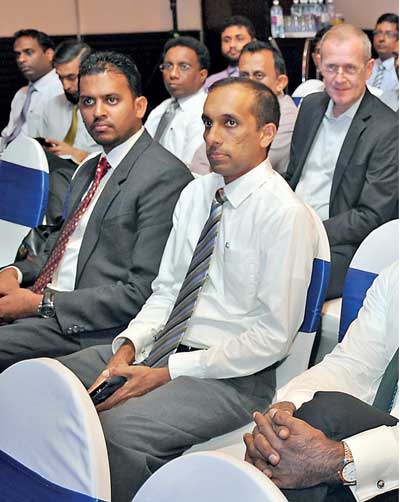 Q: I understand that you often have for opportunities for certain sectors. Would you be able to provide guarantees for financial sector?
Q: I understand that you often have for opportunities for certain sectors. Would you be able to provide guarantees for financial sector?
Lasitha: The constraints around the sectors for us is that we belong to a family of different funds which have measured to encourage infrastructure facilities. Infrastructure is what ultimately makes countries develop. I hear a lot of people talking about micro finance and SME financing, which are very important. From our perspective, we need to show a link in terms of what we are supporting. For example, if a bank wants to borrow dollars offshore and TCX swap credit into local currency, but the offshore investor investing is not comfortable taking all the credit risk of Sri Lanka, we can help by providing guarantee for that offshore investor by looking at credit risk. TCX could help by swapping out the currency risk for the local bank and we will support it on the basis that some of the money invested would be used ultimately for infrastructure development in the country. May it be for vehicle leasing or for vehicles, developing roads or any other sector as far as you can show that tangible link we can do it. There are ways and means to get around with it.
Q: Of FMO’s portfolio in Sri Lanka, how much of it is in local currency?
Matthijs: We have investments of course on our balance sheet. Those are 100% in Dollars, but we also have Government funds and there are couple of local currency equity or equity like investments in there.
Q: What steps should a financial institution follow in terms of getting that kind of local currency solution?
Matthijs: Well…I think after having discussions with the financial companies during the last couple of days is that the pricing is not good enough in terms of local currency and there is no long term funding opportunities. So, it is difficult for us to make it. Therefore, I think going forward it is important to continuously keep an eye on local currency funding and if you don’t do it right now, it could be a good reason to do it now. Short term hedging with long term funding and look at the combine cost or the average cost. But I got the impression that actually couple of large financial companies do have access to funding at the moment.
Q: Usually the foreign funding is mainly for projects. Have you had the experience of solutions for working capital or for liquidity purposes? How do you manage that?
Andrei: Indeed long term financing purposes. But at the same time the bank treasurers may have simple questions of covering up liquidity gap, it could be foreign currency or local currency for the reason of mismatch between assets and liabilities among purposes. We believe that financial interbank market is important and it is important to have enough tools for treasury to cover liquidity gaps in an efficient way also long-term funding takes time usually to do it. In countries where it is not available that’s where we would like to step in.
Q: A common issue is about when someone had secured a foreign loan dollar whilst receivables are in local currency. How would you help mitigate foreign currency risk?
Jerome: We provide an interest contract against depreciation. So that the contract would be a swap or a forward. Then what is open is on the interest rate exposure. So financial institutions can decide whether they secure their product on a fixed or floating rate.
Q: Jerome, you mentioned about the volatility in the currencies. We have had fairly stable arrangements in the last few years. Is there a decisive differential between the currency depreciation and local interest rates? Do people start looking at it when differentials are larger or they should look at any given time?
Jerome: They start looking at it when it is too late unfortunately.
Arno: Our experience as foreign entities, when we communicate to our clients in Sri Lanka, what we require is a dedicated team from your side, otherwise it makes no sense. You really need to allocate time and people for us, if you do it will make sense.
Q: How do you pacify investors with regard to exchange risks?
Arno: All equity firms like ours need to make a diversification of the assets. What you often see is that it doesn’t take place in your countries because if you are only investing in Sri Lanka as a foreign investor who has high risk on Sri Lankan rupees, to mitigate that risk you spread it to India, Bangladesh, Philippines and you try to compose for each investment 15% to 20% of all your portfolio. In some countries it is hedged and you cannot exit, while in other countries you can make very good yields. If the rupee falls, then the overall investment would be negative.
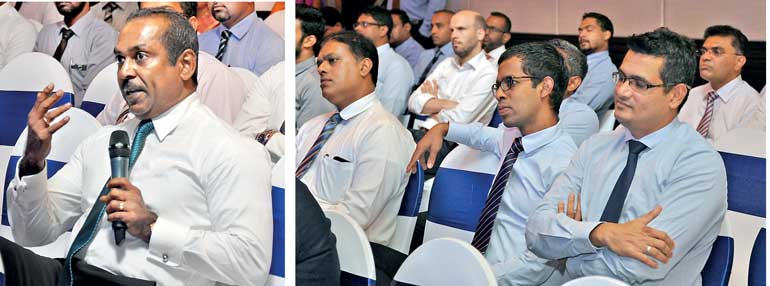
Q: Would you come into guarantee something ongoing or from the beginning?
Lasitha: We can do a mixture. We are looking at a cement project in Hambantota. That’s for an offshore Asian investor. At the same time, we are looking at a municipal which is looking at raising long-term financing to rehabilitate a water reservoir. So we can do both.
Q: We have an EPF which invests primarily in Government securities. You spoke of the case study there. Can Sri Lanka look at something like in Nigeria?
Lasitha: Of course. What we are doing in Nigeria is quite interesting for us. That model has created so much demand. Unfortunately majority has been invested in Government treasury. We are setting up a Nigerian GuarantCo, so we are actually partnering the Nigerian Government to develop the company and we are going to list it locally. We actually see a lot of potential for something like that in Sri Lanka as well. One of the challenges we find in Sri Lanka is the reluctance. We are trying to convince people that the only way you can get comfortable with new currency risks is by doing that.
Q: The Government has a serious budget issue. The former Governor mentioned that the Government is going to rely more on private sector financing on infrastructure. In that emerging scenario and given the tight liquidity issue in the market right now, how could companies like yours really promote private sector financing into infrastructure?
Matthijs: Like I said in my presentation, FMO is involved in infrastructure. There are new initiatives where we are working with large building companies, infrastructure companies to facilitate large projects. FMO is more like a project coordinator and financing particular companies involved in infrastructure projects.
Q: Given your experience, what would be your advice to the financial sector in this emerging scenario of greater private sector investments for infrastructure projects?
Lasitha: The future of Sri Lanka is to embrace technology. Unless they are specifically infrastructure focused, it takes a while for them to get comfortable with the technology. The market is not quite delivering what is needed to get things done and that’s where we need to work and try and get local banks and financial companies to get more comfortable with that. Our liabilities don’t match that asset, so let’s create them.
Q: What should Sri Lanka do in terms of getting some of the priorities right in trying to get some of the solutions that you are trying to promote?
Matthijs: I think it is important to have an institution under treasury as well. Make sure you start working on solutions. It takes time to take place, so start today. Dedicated team, try on new solutions. Go slow to go fast. Make sure that is there in the contingency plan.
Jerome: I don’t think the investment banks have the capacity like we do to help and support. We are all very keen on running that extra mile to support you.
Andrei: We need to explore new streams. We have more patience than global investment banks. Just try us out.
Arno: There need to be entities that understand us, who can act as an in-between bridge.
Dilshan: I think the initial reluctance is always there, because the whole process takes a long time. It is actually very easy to deal with these institutions once you get to know them. It is always the first deal that is difficult to get going.
Audience Q&A
Q: Certain financial institutions have limitations to access to financing in local markets. But will GuarantCo step in anytime to be a conduit to get into international financial markets?
Lasitha: Yes. GuarantCo’s vision is to promote local currency. It is been recognised that there are certain circumstances where it is valuable for GuarantCo to step in to support hard currency transactions. In a liquidity-constrained market like Sri Lanka would be at the moment it makes sense to grow and bring in dollar financing on the basis that there are dollar income revenues which can be matched to take the currency risk and thereafter we can look at supporting it. We are even contributing to Japanese investments to come into Sri Lanka. So we could even look at guaranteeing yen, offshore yen bonds for Sri Lankan entities. FMO and GuarantCo is keeping up to do something similar in India to do an offshore Rupee bond.
Observations
Dilshan: If I may to add it from an issuer’s or borrower’s perspective, as to why it is quite opportune for us to borrow from the developed financial institutions, I think most of the banks and finance companies present here would agree that we have a liquidity shortfall. Our market is currently Rs. 40 to 50 billion in deficit. We know Government securities are being held by the Central Bank which is effectively printed money. If you look collectively it is as high as Rs. 260 billion. Adding to that our market is short of Rs. 300 billion which is about $ 2 billion. Right now, I know banks and finance companies are struggling to raise cash to meet the demand out there. Previously we had a consumption-led credit growth that was probably excessive, various controls have been brought to control that. There is an acute shortage of cash and I think all the banks and finance companies present here would agree that you cannot raise that cash domestically. I think that’s probably the most compelling reason right now to look at how you can raise liquidity.
The second point is that we do not have long-term funding ability; basically you cannot generate anything beyond five years. It is very tough. Ten to 15 years are probably unheard of from a local perspective. Another negative factor all these banks and finance companies may look at is financial governance that are probably imposed by your organisations which is a little bit of a headache in their opinion. I think we need to think beyond from a perspective of those things that will bring about good governance, best practices, risk management technicalities that we do not have here and ultimately help the organisation to grow in the long-term.
Lasitha: You mentioned lack of capital in the markets. But there is a need, isn’t it?
Dilshan: Definitely. If you just analyse the balance sheets of both banks and financial companies, you would find that inherently everyone carries that mismatch of short-term liabilities and long-term assets, while exposing yourself for interest rates and liquidity risks. I think that is the biggest drive for me.